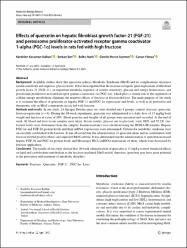Effects of quercetin on hepatic fibroblast growth factor-21 (FGF-21) and peroxisome proliferator-activated receptor gamma coactivator 1-alpha (PGC-1α) levels in rats fed with high fructose
Künye
Kocaman Kalkan, K., Şen, S., Narlı, B., Seymen, C. M., & Yılmaz, C. (2023). Effects of quercetin on hepatic fibroblast growth factor-21 (FGF-21) and peroxisome proliferator-activated receptor gamma coactivator 1-alpha (PGC-1α) levels in rats fed with high fructose. Molecular Biology Reports, 1-15.Özet
Background: Available studies show that quercetin reduces Metabolic Syndrome (MetS) and its complications, increases insulin sensitivity and improves glucose levels. It has been reported that the increase in hepatic gene expressions of fibroblast growth factor-21 (FGF-21), an important metabolic regulator of insulin sensitivity, glucose and energy homeostasis, and peroxisome proliferator-activated receptor gamma coactivator-1α (PGC-1α), which plays a central role in the regulation of cellular energy metabolism, eliminate the negative effects of fructose in fructose-fed rats. The main purpose of our study is to examine the effects of quercetin on hepatic FGF-21 and PGC-1α expressions and levels, as well as its protective and therapeutic role on MetS components in rats fed with fructose.
Methods and results: In our study, 24 Sprague Dawley male rats were divided into 4 groups: control, fructose, quercetin, fructose+quercetin (n = 6). During the 10-week experiment, quercetin was administered at a daily dose of 15 mg/kg body weight and fructose at a rate of 20%. Blood pressure and weights of all groups were measured and recorded. At the end of week 10, blood and liver tissue samples were taken. Serum insulin, glucose and triglyceride, total, HDL and VLDL cholesterol levels were determined from the samples. Insulin resistance was calculated using the HOMA-IR formula. Hepatic PGC-1α and FGF-21 protein levels and their mRNA expressions were determined. Criteria for metabolic syndrome were successfully established with fructose. It was observed that the administration of quercetin alone and in combination with fructose exerted positive effects and improved MetS criteria. It was determined that the administration of quercetin increased hepatic FGF-21 and PGC-1α protein levels and Messenger RNA (mRNA) expressions of them, which were decreased by fructose application.
Conclusions: The results of our study showed that 10-week administration of quercetin at 15 mg/kg exerted beneficial effects on lipid and carbohydrate metabolism in the fructose-mediated MetS model; therefore, quercetin may have great potential in the prevention and treatment of metabolic disorders.
















